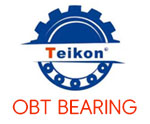
Time: 2024-11-20
1. Classification by load direction
Spherical bearings can be divided into the following categories according to the load direction or nominal contact angle:
a) Radial bearings
Mainly bear radial loads, with a nominal contact angle between 0°≤τ≤30°, specifically divided into:
Radial contact spherical bearings: nominal contact angle τ=0°, suitable for bearing radial loads and small axial loads.
Angular contact radial spherical bearings: nominal contact angle 0°<τ≤30°, suitable for bearing combined loads of radial and axial loads at the same time.
b) Thrust bearings
Mainly bear axial loads, with a nominal contact angle between 30°<τ≤90°, specifically divided into:
Axial contact thrust spherical bearings: nominal contact angle τ=90°, suitable for axial loads in one direction.
Angular contact thrust spherical bearings: nominal contact angle 30°<τ<90°, suitable for mainly bearing axial loads, and also for bearing combined loads.
2. Classification by outer ring structure
According to the different outer ring structures, spherical bearings can be divided into:
Integral outer ring spherical bearings
Single-slit outer ring spherical bearings
Double-slit outer ring spherical bearings
Double-half outer ring spherical bearings
3. Classification by whether or not a rod end body is attached
According to whether or not a rod end body is attached, spherical bearings can be divided into:
General spherical bearings
Rod end spherical bearings
Among them, rod end spherical bearings can be further classified according to the connection characteristics of the parts that match the rod end body and the rod end handle:
According to the different parts that match the rod end body
Assembled rod end spherical bearing: a rod end with a cylindrical hole rod end eye, in which a radial spherical bearing with or without a bolt rod is installed.
Integral rod end spherical bearing: a rod end with a spherical inner hole rod end eye, in which a bearing inner ring with or without a bolt rod is installed.
Ball head bolt rod end spherical bearing: a rod end with a ball head seat, in which a ball head bolt is installed.
According to the connection characteristics of the rod end shank
Internally threaded rod end joint bearing: the rod end shank is an internally threaded straight rod.
Externally threaded rod end joint bearing: the rod end shank is an externally threaded straight rod.
Rod end joint bearing with welded seat: the rod end shank is a flange seat, a square seat or a cylindrical seat with a locating pin, which is fixed to the end of the rod by welding.
Rod end joint bearing with locking seat: the rod end shank is internally threaded and slotted and equipped with a locking device.
4. Classification by whether relubrication and maintenance are required
Spherical bearings can be divided into the following categories according to whether relubrication and maintenance are required during operation:
Maintenance lubricated spherical bearings
Maintenance-free self-lubricating spherical bearings
5. Classification by sliding surface friction pair materials
According to the combination of sliding surface friction pair materials, spherical bearings can be divided into the following categories:
Steel/steel spherical bearings
Steel/copper alloy spherical bearings
Steel/PTFE composite spherical bearings
Steel/PTFE fabric spherical bearings
Steel/reinforced plastic spherical bearings
Steel/zinc-based alloy spherical bearings
6. Classification by size and tolerance units
Spherical bearings can be divided into the following categories according to the units of size and tolerance units:
Metric spherical bearings
Inch spherical bearings
7. Classification by comprehensive factors
According to the load bearing direction, nominal contact angle and structural type, spherical bearings can be comprehensively divided into the following categories:
Radial spherical bearings
Angular contact spherical bearings
Thrust spherical bearings
Rod end spherical bearings
8. Classification by structural shape
Spherical bearings can also be divided into many types according to their structural shape (such as whether there is a sealing device, the structure of the lubrication groove and lubrication hole, the structure of the lubricant distribution groove, the number of locking ring grooves and the rotation direction of the rod end thread, etc.).